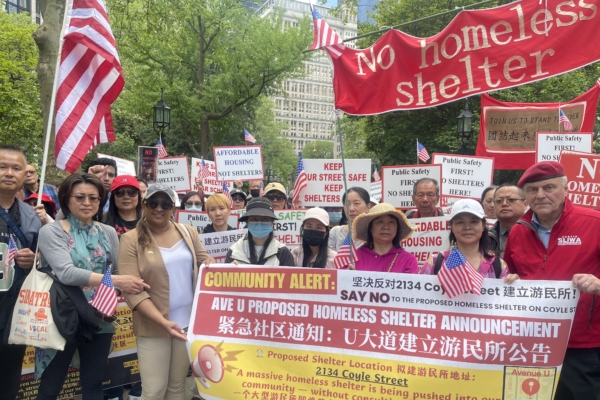On May 7th, the Brooklyn Supreme Court held a hearing regarding the disputed case of a planned homeless shelter at 2134 Coyle Street off Avenue U in Sheepshead Bay. The developer sued two nearby Chinese homeowners, alleging that they violated a signed “access permit agreement” by obstructing their demolition and construction preparations on the adjacent property. However, the judge ultimately ruled the agreement as invalid and dismissed the developer’s claims of breach of contract and injunction.
The developer’s attorney, Eli D. Raider, argued in court that the issue at hand is not about community support for the homeless shelter but about upholding the developer’s legal right to access the neighboring property and install building safety measures. Despite the court’s previous approval for entry through the front gate, construction workers continued to face significant disruptions, including instances of unauthorized entry, police intervention, and multiple arrests.
Raider emphasized that the demolition involves an old one-story warehouse, and the new construction to be built will be further away from neighboring properties, in compliance with city building regulations. He further added that the demolition permit obtained in March this year is set to expire in July, and any delays in commencing the demolition could result in significant financial and administrative losses.
One key point of contention in the case revolved around the legality of the “access permit agreement.” Raider pointed out that while the agreement was under the name “Coyle Street Owner LLC,” the signatory was from “Coyle Street Properties LLC.” Despite the differing names, the terms of the agreement were purported to apply to related subsidiaries, affiliates, buyers, and their successor entities. The Vice President of the plaintiff, Westhab, Andrew Germansky, testified confirming that Westhab is the sole member company of the developer.
Raider mentioned that the project is set to create 175 apartments as part of the city’s “Turning the Tide Initiative” for transitional housing, primarily for homeless women with children to stabilize their education and healthcare during a one-year transition period.
He emphasized that this type of “transitional housing” differs from the traditional concept of a shelter, as residents will reside long-term in units with complete kitchens rather than rotating temporary beds. The city’s task force has established certain guidelines, with a “restrictive declaration” explicitly stating eligibility for transitional housing, low-income rental housing, or other approved municipal purposes.
During the trial, the judge repeatedly questioned the developer’s representative about whether the initial submission to the community board clearly indicated the project’s intended use as a homeless shelter. While Raider insisted it was indeed transitional housing with affordable housing attributes, he was vague regarding the explicit mention of a “shelter use.”
The defense attorney for the Chinese homeowners, Benjamin Xue, argued that when the homeowners signed the agreement, the developer had represented the project as affordable housing, not a shelter. He highlighted that the project was initially approved in 2021 under the ULURP process as affordable housing, garnering community support based on the belief it was for middle-class housing. However, the developer later shifted the project to a shelter, causing significant community backlash, with two thousand people protesting and several arrests.
Xue refuted the breach of contract allegations against the homeowners, stating that the so-called “authorization agreement” was only two pages long, lacking formal signatures from both parties. Moreover, he claimed that at the time of mailing in August 2023, Coyle Street Owner LLC did not have ownership of the property (acquired in May 2024), rendering them unauthorized to sign the agreement.
He described the developer’s pressure on the homeowners to sign the agreement as coercive, with threats of legal action if they refused, suggesting the homeowners signed under duress and false promises rather than entering into a formal contract. He added, “This is not a legitimate contract – there are no permit fees, safety plans, or specific terms, just a mere letter.”
Regarding the compliance of the shelter with existing zoning regulations, Xue explained that while the zoning had changed, it was based on the premise of affordable housing. If the project’s purpose shifted, he argued that it should trigger a new ULURP process.
He also pointed out that the developer currently lacks a valid demolition permit for 2134 Coyle Street, attempting to rectify the issue previously but having their request rejected by the Buildings Department in February due to an ongoing stop-work order. Using the permit for the adjacent 2114 property as a basis for demolishing at 2134 was deemed unacceptable.
Additionally, he raised concerns about the significant disparity in the real estate splitting arrangement – one property valued at $23 million transferred to entities under the developer’s control while another valued at $3 million was allocated to them. These discrepancies raised suspicion about the transactions.
In the end, the judge ruled the “access permit agreement” between the developer and the Chinese homeowners as invalid and dismissed the developer’s request for an injunction to halt the construction.
Following the hearing, the developer’s attorney, Raider, informed the press that they do not intend to appeal the decision due to the lengthy process. Instead, they plan to pursue a special procedure under Real Property Actions and Proceedings Law Section 881, seeking court permission for temporary entry to the neighboring property to install necessary construction protections. The case is expected to be reviewed by the same judge within weeks for further proceedings.

